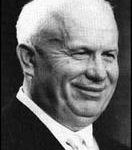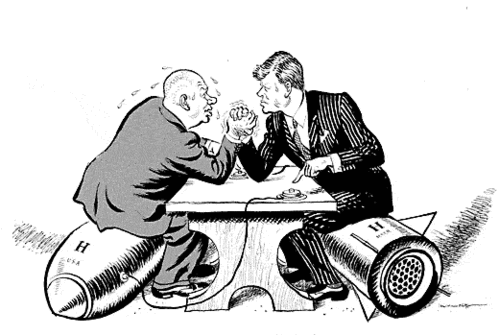Collective Leadership 1953
- After Stalin’s death, the party leaders wanted collective control so that no single leader could again dominate party and
 government.
government. - Following his death in March 1953, the collective leadership that emerged was made up of Malenkov (Soviet Premier), Molotov (Foreign Secretary), Bulganin (Deputy Premier), and Khrushchev (Party Secretary).
- The immediate problem they faced was with Lavrenti Beria, Stalin’s chief of the MVD. Head of the secret police that had succeeded the Cheka, they feared that he might use his organizations a base for a power bid.
- In June 1953, troops surrounded Beria’s apartment and took him into custody. He was arrested, tried and then shot, and this was one of the few executions during the post-Stalin struggle.
- The bloodlettings of the 1920’s were not going to be repeated and from now on, political errors would be penalized with demotion or dismissal.
- In the power vacuum that resulted, authority gradually shifted to Nikita Khrushchev.
Profile
- Outwardly a jovial and friendly man, Khrushchev was a tough realist who had enforced Stalin’s purges in Ukraine as provisional secretary had been a member of the Central Committee since 1934 and the Politburo since 1939.
- He knew that change would be needed and therefore, encouraged for a greater measure of cultural and intellectual freedom-a “thaw”; relative easing of tensions.
Secret Speech 1956
- In a speech to 20th party congress he revealed the “crimes of the Stalin era” giving disclosures on the Stalinist terror over the years.
- In his report which took a whole weekend to deliver, Khrushchev surveyed Stalin’s career since the 1930’s exposing the crimes he had committed against the Party.
- Stalin was guilty for “flagrant abuses of power” and was personally responsible for the purges and executions of the 1930’s in which millions of innocent people were victims. Revealed Stalin’s initial loss of nerve at the time of the German invasion in June 1941. Ridiculed the idea of Stalin as a war hero and one of his jibes was that “Stalin had used a globe as opposed to a detailed map to plan the defence of the USSR”.
- Cult of Personality, all the mistakes perpetrated in the USSR had been a consequence of Stalin’s lust for personal power, his “mania for greatness”.
Significance
- Was a remarkable event in USSR and communist history. For a quarter of a century before 1953, Stalin had been revered as Lenin’s heir, and had come to personify communism itself. “To attack such a legend so soon after his death created a real danger of disruption within the USSR and in the ranks of international communism”. The attack on Stalin undermined the faith in a regime that had permitted such terror.
- It justified the introduction of a more progressive economic measures within the USSR to ensure co-existence with the West. It absolved the other USSR leaders, of which Khrushchev was one, of their complicity in Stalin’s actions. Finally, the charges against Stalin were always expressed in Crimes against the party. He concentrated his attack on Stalin’s cult of personality placing the failures of Russia solely on him. Therefore, the reputation of the USSR was undiminished. Now he was free to introduce changes of policy and strategy.
De-Stalinization
- In his de-Stalinization period all cities named in Stalin’s honour were renamed, Stalingrad to Volgrad.
- For the economy, Khrushchev asked for decentralization. Wanted to loosen tight central economic controls, by creating regional economy committees. Factory managers were given greater autonomy, and the country successfully tested the H-bomb, launched the Sputnik and built its first IBM. USSR economy said to be second only to that of the US in GNP and Khrushchev boasted in the 1960’s that the USSR would surpass the US.
- His most ambitious efforts lay in agriculture, the weakest sector of the economy ever since Stalin’s forced collectivization. He wanted to cultivate the “virgin lands” of the Soviet Central Asia in Kazakhstan and elsewhere. He was unable to alter the bureaucratized system of collective state farms or inspire the collective farmers to increase their crops.
- For the party itself he wanted to implement fixed terms of office for party members in important posts.
- He pursued an erratic foreign policy. He spoke of peaceful coexistence and said that war between the US was and other capitalist countries was not inevitable. But in 1962, he overreached himself in the Cuban missile crisis.
- “His boastfulness and recklessness, his retreat in Cuba, the failure of his agricultural and other economic policies, his attempt to tamper with the party itself led to his downfall” and in 1964 he was ousted from office.
The Cuban Missile Crisis 1962
- Fidel Castro, revolutionary leader of Cuba since 1959, declared himself a Communist leader and took the steps to end U
 S economic domination on the island.
S economic domination on the island. - Khrushchev arranged for the USSR to buy up Cuba’s sugar crop and offered economic assistance. He was interested in Cuba because it was an opportunity for him to establish a foothold in the western hemisphere. USSR hoped an d USA feared that the creation of a Russian backed Marxist state in Cuba would be a prelude to the rapid spread of USSR style Communism throughout South America.
- Khrushchev warned the US that it would be prepared to act if the US used force against Cuba. USSR increased its involvement within Cuba culminating in Operation Anadyr, the installation on the island of USSR nuclear missiles capable of destroying almost all US states. Khrushchev wanted to turn the island into a “impregnable fortress Missile forces must be ready on signal from Moscow to launch nuclear missile strikes on important targets in the United States”.
- Dmitri Volkogonov, Soviet historian states that “Khrushchev was elated. He had not felt like this since his days as a member of the Military Council at Stalingrad and Kursk, during the war. Then, however, he had been carrying out Stalin’s will, whereas now it was he who was generating the ideas and exercising the decisive will to bring off this vast enterprise, which required huge resources and a great concentration of forces”.
- Khrushchev wanted to “put one of our hedgehogs down the American trousers”.
- He justified USSR actions stating that the nuclear devices were there to defend Cuba against possible US intervention. Kennedy announced a naval blockade of Cuba until the missiles were removed and stated that “if any attempt were made to use them against the USA he would order a retaliation in kind”. When Khrushchev compared the proximity of USSR weapons in Cuba to that of US missiles in Turkey the neighbour of the USSR, Kennedy stated that “US rocket bases were there to defend Europe, whereas the only conceivable purpose of the USSR missiles in Cuba was to threaten the USA with a direct nuclear attack”. This statement was backed up by placing the US armed forces on nuclear war alert.
- Khrushchev not wanting to risk a full scale nuclear confrontation and gave the order for USSR ships which were about to attack the US naval blockade to halt. After discussions between Kennedy and Khrushchev, he agreed to withdraw USSR missiles from Cuba and the US presented reduced the USA’s base in Turkey.
- In USSR it was viewed that they had backed off and were unable to reassert their influence in the Western hemisphere. This defeat damaged USSR international standing and led to serious criticism of Khrushchev within the USSR. “Comrade Khrushchev declared that if the USA touched Cuba we would launch a strike against it. He insisted that our missile be sent to Cuba. This provoked the most serious crisis, bring the world to the brink of nuclear war; the organizer of this most dangerous venture himself was greatly alarmed. Having no other way out, we were forced to accept all the demands and conditions dictated by the USA”.
Bibliography
Colton, Joel. A History of the Modern World. Toronto: McGraw-Hill, 1995.
Lynch, Michael. Stalin and Khrushchev: The USSR 1924-64. London: Hodder & Stoughton Educational, 2001.
